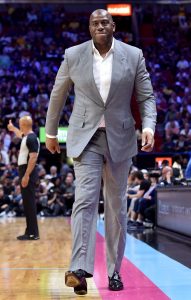Stephen Curry isn’t reluctant to stake his claim as one of the best point guards in NBA history. The Warriors star put himself in elite company during a recent appearance on Gilbert Arenas’ podcast.
“It’s me and Magic (Johnson), is that the conversation? Obviously, I have to answer that way,” Curry said in response to a question from Arenas. “Magic’s resume is ridiculous. So the fact that we’re having that conversation, that’s the place I never thought I’d be in.”
Both players are obviously on the short list of legendary point guards. They amassed a wealth of titles and individual honors throughout their careers, and both significantly changed the way the game is played.
Curry is a four-time champion, a two-time scoring leader, a nine-time All-Star and a two-time MVP who was the first player in league history to win the award in a unanimous vote. He has 21,712 career points, 5,740 assists and a record 3,390 three-pointers, and at age 35 he still has time to add to those numbers.
Johnson was among the most dynamic players of the 1980s and the catalyst for the “Showtime” Lakers. He was an All-Star in 10 of his first 11 seasons, missing only because of injury, before HIV forced him into his first retirement in 1991. He won five titles, three MVP awards and three Finals MVP honors. With 17,707 career points and 10,141 assists, Johnson was voted onto the league’s 50th and 75th anniversary teams.
While Curry and Johnson are strong candidates, there are plenty of others to consider:
- In the 1960s and early ’70s, Oscar Robertson was routinely putting up triple-doubles before it was celebrated as a stat. The 1964 MVP spent most of his career with the Cincinnati Royals before winning his only NBA title with the Bucks in 1971. He was an All-Star in his first 12 NBA seasons, being named MVP of the game three times, and was a nine-time first-team All-NBA selection.
- Lakers star Jerry West was a contemporary of Robertson’s and his rival as the best guard in the game at the time. West was an All-Star in all 14 of his NBA seasons and was an All-NBA selection 12 times. He was named Finals MVP in 1969 even though the Lakers lost the series, then won his only championship in 1972.
- John Stockton is the NBA’s career leader in assists with 15,806 and led the league in that category for nine straight seasons. The 10-time All-Star is also the league’s all-time steals champ with 3,265 and was named to the All-Defensive Team five times. He spent his entire 19-year career with the Jazz and remained productive through age 40.
- Isiah Thomas led the “Bad Boy” Pistons to titles in 1989 and 1990 at a time when the Lakers and Celtics were dominating the league. The 12-time All-Star was named Finals MVP in 1990 and twice captured All-Star MVP honors.
- Chris Paul is the only active point guard with a resume similar to Curry’s, although without a similar level of playoff success. A 12-time All-Star, Paul led the NBA in assists five times and in steals six times. He’s an 11-time All-NBA and nine-time All-Defensive Team selection.
- Steve Nash is a two-time MVP who also revolutionized the game with his accomplishments in Phoenix. An eight-time All-Star and seven-time All-NBA selection, he reached the 50-40-90 club as a shooter four times in his career.
There are many more to consider, such as Bob Cousy, Walt Frazier, Jason Kidd, Gary Payton, Nate Archibald, Pete Maravich and others, and we could go on much longer about their place in the history of the league. But we want to get your opinion. Who’s really the best point guard that has ever played? Please leave your response in the space below.
